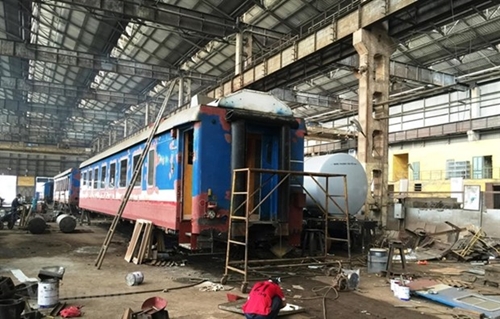Government Decree 65/NĐ-CP currently regulates that 40-year-old locomotives and carriages can no longer be used, which has caused a shortage of locomotives and carriages for the sector, according to the VNR.
At present, the VNR is managing 282 locomotives, of which 262 are in use. The remaining 20 are left idle because they are too out of date, have low capacity and consume lots of fuel while repairs are too expensive.
Data of the VNR showed 121 locomotives will not be used from the beginning of next year to 2026 due to the age rule, leaving it with only 141 by 2026.
    |
 |
|
Carriages are under repairs at Gia Lam Train Joint Stock Company in Gia Lam district in Hanoi. |
Also under Decree 65, the VNR will have 196 locomotives by the beginning of 2022, but it usually needs about 217 to accommodate the Tet (Lunar New Year) holiday rush.
Hoang Gia Khanh, Deputy Director of the VNR, said all of the locomotives in use at present are up to safety standards and some have received overhauls recently.
Regarding carriages, the railway sector manages more than 1,030 carriages. Under Decree 65, as many as 794 should have come out of use at the start of this year, but they continue to be used as the VNR says they are in good condition and there is no alternative.
Khanh confirmed that all of the carriages are periodically maintained and were certificated by the Vietnam Register for satisfying technical and environmental protection regulations.
“All of the carriages ensure technological safe norms to operate on the country’s railway system,” he said.
Khanh said if the 86 carriages that carry materials for railway infrastructure repair went out of use, many difficulties would occur while conducting the project of renovating and upgrading the Hanoi-HCM City railway system.
To have enough locomotives, the VNR started a project to invest in buying 32 new locomotives in 2016. However, the project is still in the research stage.
Each new locomotive would cost about VND 1.5 billion (USD 65,200), so a great deal of investment was needed, said Khanh.
Vu Anh Minh, chairman of the VNR, said investing in new equipment would put a lot of financial pressure on railway enterprises.
Minh said that the VNR had worked with different foreign partners to discuss investment methods to get more new trains while reducing this pressure.
“The partners will build new trains and the VNR will rent them. When the renting period ends, the trains will belong to the VNR. In fact, it is paying by instalments,” said Minh.
The price to make a train could also be cut by 10 per cent by avoiding intermediate expenses.
“With the form, railway sector can replace all out-of-date carriages, and the more important thing is that it will help improve the sector’s quality because it can learn from experience and access modern technology,” said Minh.
Source: VNA